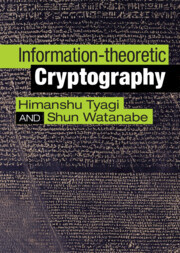Information-theoretic Cryptography
Langue : Anglais
Auteurs : Tyagi Himanshu, Watanabe Shun

This graduate coursebook offers a mathematical foundation for modern cryptography for readers with basic knowledge of probability theory.
This book offers a mathematical foundation for modern cryptography. It is primarily intended as an introduction for graduate students. Readers should have basic knowledge of probability theory, but familiarity with computational complexity is not required. Starting from Shannon's classic result on secret key cryptography, fundamental topics of cryptography, such as secret key agreement, authentication, secret sharing, and secure computation, are covered. Particular attention is drawn to how correlated randomness can be used to construct cryptographic primitives. To evaluate the efficiency of such constructions, information-theoretic tools, such as smooth min/max entropies and information spectrum, are developed. The broad coverage means the book will also be useful to experts as well as students in cryptography as a reference for information-theoretic concepts and tools.
1. Introduction; Part I. External Adversary: Encryption, Authentication, Secret Key: 2. Basic information theory; 3. Secret keys and encryption; 4. Universal hash families; 5. Hypothesis testing; 6. Information reconciliation; 7. Random number generation; 8. Authentication; 9. Computationally secure encryption and authentication; 10. Secret key agreement; Part II. Internal Adversary: Secure Computation: 11. Secret sharing; 12. Two-party secure computation for passive adversary; 13. Oblivious transfer from correlated randomness; 14. Bit commitment from correlated randomness; 15. Active adversary and composable security; 16. Zero-knowledge proof; 17. Two-party secure computation for active adversary; 18. Broadcast, Byzantine agreement, and digital signature; 19. Multiparty secure computation; Appendix. Solutions to selected problems; References; Notation index; Subject index.
Himanshu Tyagi is an associate professor with the Department of Electrical Communication Engineering at the Indian Institute of Science, Bangalore. A specialist in information theory, his current research focuses on blockchains for crowdsourced networks, distributed statistics under information constraints, and privacy for federated learning data pipelines. He has served as an associate editor for the 'IEEE Transactions on Information Theory' and has been awarded the Indian National Science Academy (INSA) Young Scientist medal for 2020.
Shun Watanabe is an associate professor with the Department of Computer and Information Sciences at the Tokyo University of Agriculture and Technology. His research focuses on the intersection of information theory and cryptography. He is a senior member of the Institute of Electrical and Electronics Engineers (IEEE) and served as an associate editor of the journal 'IEEE Transactions on Information Theory' from 2016 to 2020.
Shun Watanabe is an associate professor with the Department of Computer and Information Sciences at the Tokyo University of Agriculture and Technology. His research focuses on the intersection of information theory and cryptography. He is a senior member of the Institute of Electrical and Electronics Engineers (IEEE) and served as an associate editor of the journal 'IEEE Transactions on Information Theory' from 2016 to 2020.
Date de parution : 04-2023
Ouvrage de 517 p.
17.5x25 cm
Disponible chez l'éditeur (délai d'approvisionnement : 14 jours).
Prix indicatif 90,27 €
Ajouter au panierThème d’Information-theoretic Cryptography :
© 2024 LAVOISIER S.A.S.
